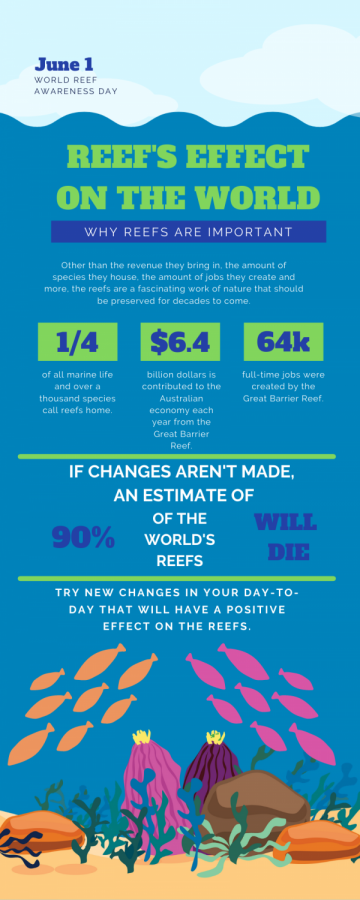Students observe World Reef Awareness Day
The reefs’ effect on the world. Sources: United States Environmental Protection Agency, Great Barrier Reef Marine Park Authority and SloActive
June 1, 2021
Celebrated on June 1, World Reef Awareness Day focuses on reef sustainability and management to bring more awareness surrounding the importance of reefs in our ecosystem.
According to the United States Environmental Protection Agency, both human and marine life heavily depend on coral reefs. Furthermore, 25% of marine life need coral reefs for basic survival, in addition half a billion human beings rely on reefs as a source of food, income and coastal protection.
Even though coral reefs are a crucial component of the environment, over 50% of the world’s reefs have died in the last 30 years, and up to 90% are estimated to die in the next century if changes aren’t made.
The state of reefs has been declining each year for multiple reasons. For one, global warming has led to a rise in ocean temperatures, inflicting major damages on coral reefs due to coral bleaching. Coral bleaching is when ocean temperatures go to extreme lows and highs, causing the algae that produce 90% of the coral’s food to become extremely stressed, leaving the coral vulnerable. The coral then turns white, which is where the term “bleaching” comes from.
“I find [the reef’s current state] very sad and disturbing,” environmental science and geosystems teacher Anne Fenton said. “I also feel a little bit of fatalism, wondering how are we going to get through this.”
According to BBC, an extreme heatwave in 2016 caused an unprecedented amount of coral bleaching on the Great Barrier Reef—the most severe of bleaching on record. One-third of the reef was affected and a mass die-off of coral took place.
“As a reef [the Great Barrier Reef] serves an important habitat for many different species and I am saddened that a portion of it has been bleached,” Fenton said. “I am hopeful that humans will figure something out to renew the reef.”
A second cause for the decline in reef health is pollution. Massive amounts of sediment are dumped into the ocean from deforestation and clearing farmland, causing erosion to flow into small, local bodies of water that eventually reach the ocean. The sediment from erosion is often filled with pesticides, fertilizers and other harmful chemicals that pollute the water and hurt the oceans’ inhabitants.
The overuse of commercial and recreational vessels is also a primary contributor to ocean pollution. Boat debris, fishing gear and sewage are dropped into the ocean, entangling and killing marine life.
Additionally, according to the Reef Resilience Network, over 55% of the world’s reefs are threatened by overfishing. Dynamite fishing has been one of the destructive methods for killing fish. Ultimately reducing fish populations and damaging coral.
“The reefs are just one habitat, but they are important for a large food chain and food web, as well as necessary for many people around the world,” Fenton said. “We don’t really know what a collapse of a food web will mean for us and other habitats.”
To properly recognize World Reef Awareness Day, people are urged to educate themselves and others about reef conservation and try to make simple day-to-day changes that will positively affect the reefs; for example, wearing reef-safe sunscreen at the beach helps keep deteriorating chemicals from going into the ocean.
“People can reduce water usage, the use of single-use plastics and just consume less seafood in general,” senior Ananya Rajesh said. “If consumers as a whole eat less seafood, the commercial fishing industry will be forced to reduce and more strictly monitor their open-ocean catches and fishing practices, which would be a good start.”
Aside from bringing in billions of dollars a year and providing thousands of jobs, the corals hold about one-fourth of all marine life and over 1,000 species call the reefs home. The corals are essential to marine ecosystems and with small changes in human activity, reefs may be able to thrive for years and years to come.
“If the reefs were gone or stayed at their current state, besides losing biodiversity—it’s the unknown, sheer beauty and wonder that we will all miss out on,” Fenton said. “We need nature to ground us emotionally, socially and mentally.”



